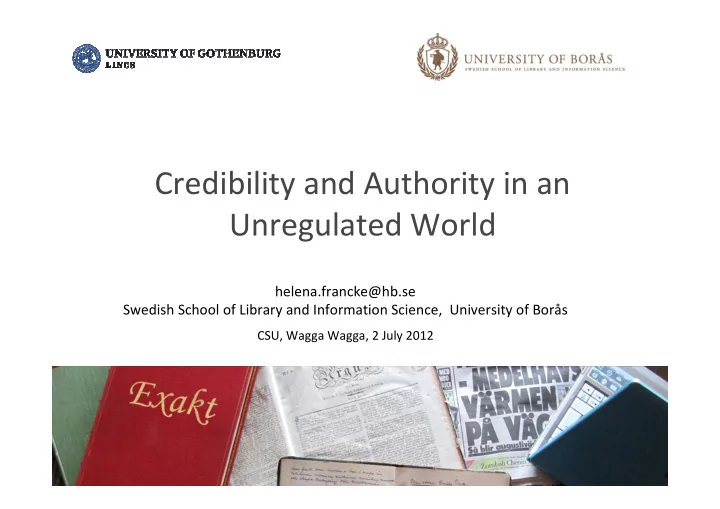

Credibility and Authority in an Unregulated World helena.francke@hb.se Swedish School of Library and Information Science, University of Borås CSU, Wagga Wagga, 2 July 2012 www.lincs.gu.se
my background www.lincs.gu.se
25 Nov 2010 www.lincs.gu.se Image from Wikipedia Commons
www.lincs.gu.se
Changing publishing patterns www.lincs.gu.se
theoretical inspirations www.lincs.gu.se
A sociocultural perspective • Information literacy enacted in various mediated activities • Cultural tools (intellectual as well as physical) mediate information seeking and learning experiences. (Vygotsky 1978; Wertsch 1998; Säljö 1999) Säljö, R. (1999). “Learning as the Use of Tools.” In K. Littleton & P. Light, eds. • Mastery and appropriation Learning and Computers . London: Routledge, 144-166. Wertsch, J. V. (1998). Mind as Action . New York: Oxford University Press. (Wertsch 1998) Vygotsky, L. S. (1978). Mind in Society . Cambridge, MA: Harvard University Press. www.lincs.gu.se
• Patrick Wilson (1983) – Second-hand knowledge Cognitive authority three tests put to documents: � interacts with the aspects above – materiality (Francke 2008) – intrinsic plausibility – publishing history – creator www.lincs.gu.se Francke, H. (2008). (Re)creations of scholarly journals: document and information architecture in open access journals . Borås: Valfrid. Wilson, P. (1983). Second-hand knowledge: an inquiry into cognitive authority . Westport, CT & London: Greenwood Press.
• Authority approach vs. • Emergent credibility • Tabulated credibility • Reputed credibility • Conferred credibility Contemporary forms of credibility Reliability approach Metzger, M.J. & Flanagin, A.J. (2008). Digital media and youth: unparalleled opportunity and unprecedented responsibility. In M.J. Metzger & A.J. Flanagin (Eds.), Digital media, youth and credibilty . www.lincs.gu.se Cambridge, MA: MIT Press. 10 f. Lankes, R.D. (2008). Trusting the Internet: New approaches to credibility tools. In M.J. Metzger & A.J. Flanagin (Eds.), Digital media, youth and credibilty . Cambridge, MA: MIT Press. 101-121.
the EXACT project www.lincs.gu.se
Expertise, Authority and Control on the Internet (EXACT) Olof Sundin Helena Francke Louise Limberg Mikael Alexandersson Anna Lundh Funded by the Swedish Research Council www.lincs.gu.se
Three studies • How is credibility negotiated and constructed by students, teachers, and school librarians in upper secondary school in relation to Internet sources? • Classroom studies – observations – interviews – information seeking blogs – documents • Teacher and school librarian focus groups www.lincs.gu.se
Three studies, cont. • How is trust in the authority of knowledge constructed in Wikipedia and in blogs. • Producers in social media – interviews – observations of writings in Wikipedia and blogs www.lincs.gu.se
secondary schools”. Journal of Documentation, 67(4), 675-694. credibility: The shaping of information literacies in upper Francke, H., Sundin, O. & Limberg, L. (2011). ”Debating What is a credible source in school? • Students’ approaches to critically evaluating information sources The articles on [a particular – strategies of control web site] are written by professors, among others, – strategies of balance which is good because I find – strategies of commitment that to be quite a credible sourse […] (Ruth/blog) – strategies of multiplicity He also links to lots of good pages, which I find really good. (Rachel/blog) I think they honestly want the world to be a better place […] (Pia/blog) www.lincs.gu.se
Genres and technologies I don’t like using facts from blogs because they are very personal and full of opinions, I only want facts, pure facts. (Kajsa/blog) I have changed my opinion of Wikipedia and in the future I PETRA: will try to use Wikipedia as But there are also blogs that contain facts. little as possible since the ”Now I’ve found this and that and it’s information there is completely correct, and so on. I’ve constantly changed. checked it.” People write that kind of stuff (Josefin/blog) too. PIA: But still, it doesn’t feel very credible. (Group 7/interview) www.lincs.gu.se
The assignment (discourses) • Nuclear power KAJSA Although now it was sort of a matter of plants - pros and finding something strongly for or against. cons We looked at that, too. But ordinarily, I • Facts – opinions / would have searched for neutral, neutrality, because it would have been for neutral sources our own project. (Group 3/interview) www.lincs.gu.se
Conceptions of Credibility in Participatory Media.” Library & Information Science Francke, H. & Sundin, O. (2012). ”Negotiating the Role of Sources: Educators’ What is a credible source in school? Research , 34(3): 169–175. http://dx.doi.org/10.1016/j.lisr.2011.12.004 • Educators’ conceptions of credibility in relation to Wikipedia […] if they use Wikipedia, they should always double-check with another source, and that means – control twice the work. (Interview L:2) – comparing sources I think Wikipedia is a great example – relational & partial of knowledge which is actually – multiplicity updated quite frequently, and which is free and independent in some sense, instead of commercial services provided by some company. (Interview T:1) www.lincs.gu.se
conclusions www.lincs.gu.se
Conclusions • Focus on facts • Focus on authorship and on comparing sources • Mastering what is a credible source in school assignments while struggling to negotiate the teacher’s expectations on the assignment www.lincs.gu.se
Thank you for listening! www.lincs.gu.se
Recommend
More recommend